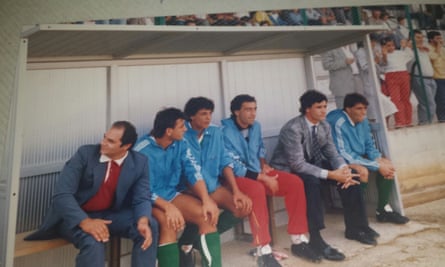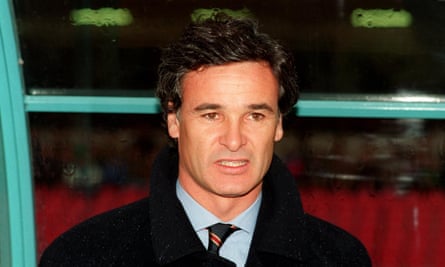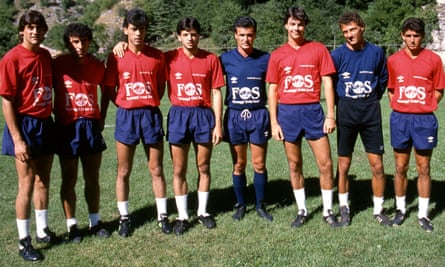Leicester City’s players were not the first to hear Claudio Ranieri ring his imaginary bell. Danny Drinkwater provoked much amusement among the British press corps last month, when he revealed the manager’s technique of saying “dilly-ding, dilly-dong” to restore focus whenever energy levels start to dip during training.
Back in Italy, though, at least one observer had a different reaction. Ivo Pulga played for three seasons under Ranieri at Cagliari between 1988 and 1991. When he came across Drinkwater’s comments, what he felt was a wave of nostalgia.
“You need to write that he invented this bell at Cagliari!” Pulga says. “As soon as I saw the story in England last month, my mind immediately went back to the training session where it happened. It was very early in the morning and us players were all a bit sleepy. [Ranieri] could see that mentally we were still in bed, so he shouted: ‘Dilly-ding, dilly-dong! Training has started! Dilly-ding, dilly-dong!’ After that, it became the calling card for our season. At Christmas, he gave us each a bell with ‘Cagliari Calcio, dilly-ding, dilly-dong’ and his name on it. I still have mine at home.”
Ranieri’s simulated alarm call was no less whimsical to Italian ears three decades ago than it is to English ones today. And yet, in both countries it has worked. The manager did not win a top-flight title with Cagliari but he did guide them to consecutive promotions from the third division all the way up to Serie A. He kept them there at the first time of asking, before landing the Napoli job in the summer of 1991.
The bell came with Ranieri to Naples, and seemingly everywhere else that he has worked since. The former Italy midfielder Antonio Nocerino, now with Orlando City in Major League Soccer, remembers him deploying it even at Juventus. “When we had a morning practice session, and some players were a bit sluggish, he would call them out to the middle of the pitch and shout: ‘Dilly-ding, dilly-dong!’ When I read this story about Leicester, I just started laughing because all those funny moments with him came rushing back into my head.”
That Ranieri has a sense of humour is hardly new information. This is a man who, while coaching Roma in 2010, closed out a tense press conference before the derby against Lazio by answering a Norwegian journalist’s question about John Arne Riise in English. When Ranieri rose to leave afterward, domestic reporters roared in anger at his failure to provide a translation. He flashed the mob a smile and lied: “I told him our starting formation.”
Just because the jokes come naturally, however, does not mean that they are without purpose. Talk to Italian players who have worked under Ranieri and almost all will all use the same word to describe his penchant for joking around. He does it to sdrammatizzare – to diminish and defuse the tension his team might be feeling in a given situation.

It is a strategy that he has deployed right from the very beginning. His first coaching job, back in 1986, was with a non-league side called Vigor Lamezia, in Calabria. The club’s then captain, Fabio Fraschetti, remembers how Ranieri used to arrive for training every Tuesday with a bundle of newspapers under his arm. “He would read out the player ratings and wind us up by saying things like: ‘Ooh, Tizio, you only got a five and a half,’” says Fraschetti. “He would joke and comment on it in ironic terms. He was not using the ratings to embarrass us. He wanted to sdramatizzare and show they did not matter. To turn the negative reviews into a positive.”
Of course, there was more to Ranieri than this. Right from the outset, he was a forward thinker when it came to tactics and training techniques. He introduced Vigor Lamezia’s players to zonal marking – not yet common on the peninsula – and spoke to them about sports psychology.
Vigor Lamezia were top of the table and unbeaten when he resigned after 12 games. “There was an agent who was very close to the president at that time,” explains Fraschetti. “He brought in a bunch of players from his stable. Ranieri did not care for this situation and continued to select whichever players he thought deserved to play. This led to friction and moments of tension. So, in the end, he resigned.”
The story hints at another common thread in players’ memories of Ranieri: that he is a man of principle, someone who will always speak honestly and look you straight in the eye. A manager who treats every person the same way, whether that be the seasoned veteran, the kid from the academy or the little old lady in the club shop.
Antonio Gatto was a 16-year-old trying to catch a break with Vigor Lamezia back in 1986. “From day one, Ranieri treated me as though I was much older,” Gatto recalls. “He spoke to me as often as he did the senior players, and he had no problem throwing me into a match. Bear in mind that, back then, I needed a signature from my parents before I was even allowed to take part in an official game.”

For Ranieri, any successful football team requires as its foundation a united group who share a sense of rowing together towards a common goal. Simone Perrotta worked under managers as talented as Luciano Spalletti at Roma and Marcello Lippi with the Italian national team. Among such exalted company, it was Ranieri’s capacity to bring people together that marked him apart.
“Different managers know how to get the best from their players in different ways,” says Perrotta. “What Ranieri did that was special was to give a sense of empathy to his team. If you, as a person, can create an empathetic situation inside the changing room, then in the difficult moments your players will always give you a little something more.”
To achieve such an atmosphere requires everybody to feel involved – right down to the supporters. At Cagliari, Ranieri used to hop in a car every Monday evening with Pulga, his captain, and drive out to visit one of the team’s countless local fan clubs for dinner and a glass of cannonau red wine. “He is remembered in Sardinia for his results,” says Pulga, “but also for who he was as a man.”
Ranieri could be hard when he needed to be. The former Middlesbrough defender Gianluca Festa, another who played under him at Cagliari, remembers preseason training as “a massacre”. But even here, Ranieri made sure that nobody was favoured. If any individual was caught going easy during a practice session, he would draw the whole squad up into two lines and send them off together for an hour‑long run.

Photograph: Olycom/PA
The stick has always been accompanied by the carrot. At times Ranieri would place bets with his players, promising them all a slap-up fish supper if they made it through a certain number of games without dropping a point. As Pulga tells it: “He lost a lot of money, too, because we won a lot of those bets.”
And then there were the little gifts that Ranieri would give out to his squad at Christmas. One year it was the “dilly‑ding, dilly-dong” bell, and another it was a golden toy Ferrari – a riff on the fact that one newspaper had described Cagliari as a sports car racing through the lower divisions.
But the present that Festa remembers best was an imitation ancient Roman coin, which had inscribed upon it one of Ranieri’s favourite phrases: “volere è potere” – literally, “to want is to be able to do”, though a better English translation might be, “where there’s a will there’s a way”.
“This, for me, was such an important sentiment,” says Festa. “When someone really wants something, deeply, profoundly, inside them, then they will succeed in getting it. Leicester this season are the classic example. Even something that should be totally impossible: if you want it truly, and are prepared to work for it, then miracles can happen.”
Note that desire alone is not enough. If Leicester stand on the verge of an historic title, it is because they dared to dream big, but also because they knew when to stop dozing and start grafting. All it took was to listen out for the “dilly‑ding, dilly-dong” of Ranieri’s alarm bell.
Comments (…)
Sign in or create your Guardian account to join the discussion